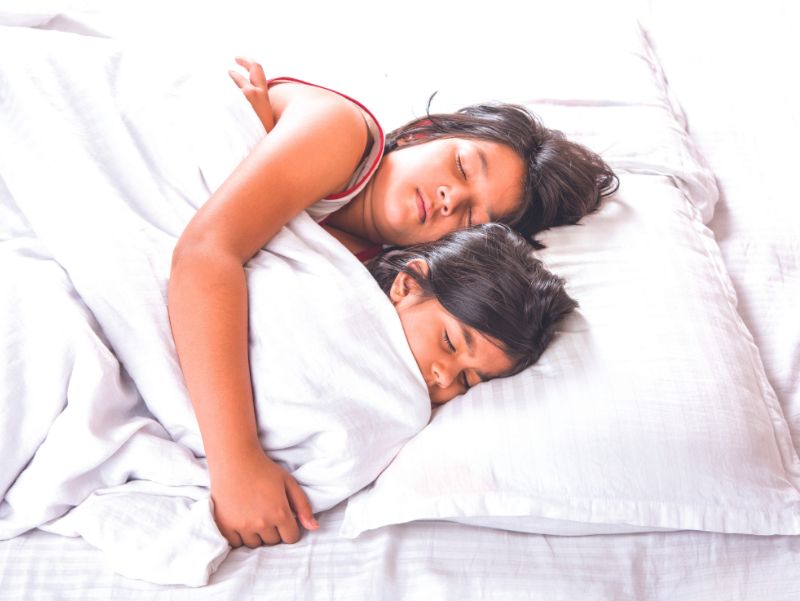Children especially need to sleep well as several essential bodily restorative changes occur during slumber. Inadequate sleep can result in height challenged, obese, unhealthy children prone to frequent infections and poor academic performance
Stages of sleep
Sleep is defined as “a naturally occurring reversible blissful state of suspended animation when consciousness is absent”. As we fall asleep, we experience three stages of non-REM (Rapid Eye Movement) sleep, each lasting 10-15 minutes. During this period the sleep is light, the person is rousable, but the heart rate slows and body temperature drops. Around an hour and a half later, REM sleep occurs, when the eyes move rapidly in different directions. The first cycle of REM lasts around 10 minutes. The non-REM-REM cycles repeat several times during the night. The length of REM sleep gets progressively longer and may last an hour or so. Dreams occur during this time. Infants spend 50 percent of their time in REM sleep. This progressively declines to 20 percent in adults.
How much sleep does a child need?
• Infants (upto two years) need 11-14 hours of sleep
• Preschoolers (two to six years) 10-13 hours
• Six to 13-year-olds: Nine to 11 hours
• Teenagers: Eight-ten hours
(Adults (above 18) need a minimum seven to nine hours)
If all this is added together, we effectively spend a third of our lifetimes asleep. It may seem like a waste of precious productive hours, but several essential body restorative changes occur during slumber. For instance the space between the brain cells increases during sleep. This boosts the flow of cerebrospinal fluid between the cells and flushes out toxins.
The growth hormone, which stimulates height growth, is secreted during sleep. Chronic sleep deprivation can result in children not realising their full height potential. Also, when children participate in physical activity, transmitter chemicals in the brain get depleted. This causes fatigue. These chemicals are replenished during sleep. Infection-fighting T cells in the blood are also formed during sleep. These remove the inflammation-causing cytokine chemicals from the blood. That’s why sleep-deprived children are more susceptible to viral and bacterial infections and take a longer time to recover.
Infants naturally get the sleep they require. But school-going children often have a plethora of reasons to stay awake and fight ‘wasteful’ sleep. There’s the temptation to watch television or play games on electronic gadgets late into nights.
Sleep deprivation consequences
Adults who are sleep-deprived become drowsy and may nod off at inopportune moments. Children react more sharply to sleep deprivation — they become irritable, hyperactive, and throw temper tantrums. Reasoning and memory are affected, and academic performance drops.
It’s also pertinent to note that sleep deprivation increases the production of stress hormone cortisol. This decreases insulin levels and increases ghrelin, an appetite stimulant resulting in overeating and obesity.
Increasingly, success in school and board exams is considered the passport to career progression. Preparations for exams start at ever younger ages these days, with children spending long hours in tutorials, coaching centres and back-to-back classes. In between, they also have homework to complete. Stressed parents often reduce children’s sleep hours. This is dangerous as inadequate sleep results in poor health and hurts academic performance.
Chronic sleep deprivation, however, doesn’t manifest in most children as they indulge in compensatory daytime napping. But bear in mind that daytime napping is possible only during holidays and with the new school year beginning this month, it’s important that you ensure children get their full quota of night sleep. Cutting back on a child’s sleep is counterproductive. It will result in height challenged, obese, unhealthy children prone to frequent infections and poor academic performance.
Improve your child’s sleep habits
Encourage children to wind down with 15-20 minutes of quiet preparation before going to bed.
Ban all digital gadgets half an hour prior to sleep.
Prohibit caffeinated beverages (coffee, tea, aerated drinks, energy drinks like Red Bull) to children below 16 years of age.
Restrict electronic media time (television, computer games, X-Box, PSP, cell phone games) to two hours a week.
Remove all electronic gadgets from children’s bedrooms.
Ensure children exercise daily with 45-60 minutes of running, cycling, swimming or 15 minutes of continuous stairs climbing. Physical fatigue ensures deep sleep.
(Dr. Gita Mathai is a Vellore-based paediatrician and author of Staying Healthy in Modern India)
